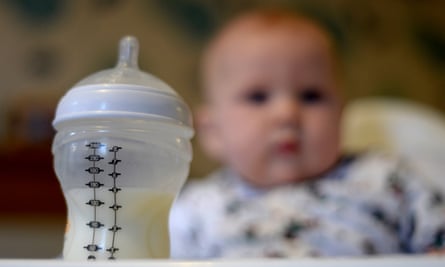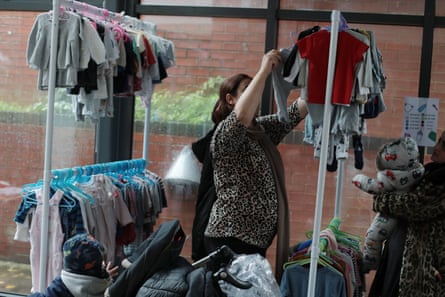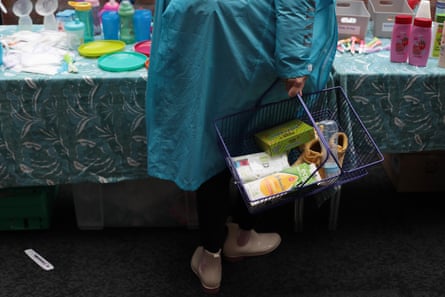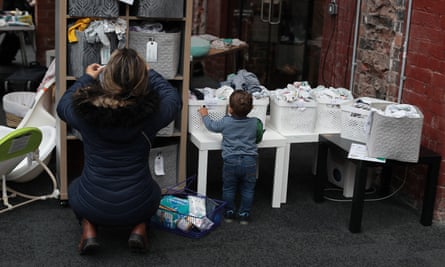
Failure to tackle the cost of soaring infant formula is creating a crisis of infant hunger and putting the health of babies from low income families at risk, clinical experts and campaigners have warned.
Leading doctors and nurses, including the Royal College of Midwives and the Royal College of Paediatrics and Child Health, have joined children’s charities in urging ministers to take urgent action to ensure parents hit by the rising cost of living can access infant formula.
In a letter to Andrea Leadsom, the children’s health minister, experts say high prices are “putting the health of non-breastfed and partly breastfed babies at risk”. It calls on ministers to improve access to formula to “those families that need it and are finding it unaffordable”.
Campaigners say record-high retail prices for infant formula meant cash-strapped parents are skipping feeds for their infants, watering down formula to make it last longer, obtaining stolen baby powder, or buying out-of-date or half-finished tins of formula from internet forums – a potentially unsafe practice known as formula foraging.
England’s 250 baby banks, set up to provide free essentials for infants, including formula, have reported a huge increase in demand from desperate parents. Volunteers have described being overwhelmed, with queues forming before opening time, forcing them to ration baby milk and turn parents away once stocks of formula have run out.
A survey by the Independent Food Aid Network (Ifan) found almost half of organisations that responded were supporting more parents this year with feeding their babies aged 0-12 months compared with the same period last year.
“There are definitely some [babies] that are going hungry,” said one baby-bank worker, who reported that demand for formula had risen by 200% in a year.
It costs at least £14.50 – more, depending on the brand – to feed a baby formula for a week. Last month the Competition and Markets Authority launched an investigation into the infant formula market after finding manufacturers raised prices by 25% in two years. Campaigners have called this profiteering while the Iceland boss, Richard Walker, accused brands of “exploitation” and backed calls for a price cap.
Erin Williams, the co-founder of Feed, an infant feeding charity said these were “desperate times” for young families that were putting children at risk of undernourishment. “It’s been described as an infant feeding crisis – but that is not an exaggeration. It’s a serious issue for babies if they are malnourished and it can result in long-lasting health and developmental issues.”
The letter, coordinated by the First Steps Nutrition trust and sent this month, is signed by 23 clinicians, academic experts and campaigners including Gill Walton, the general secretary of the Royal College of Midwives, Alison Morton, the chief executive of the Institute of Health visiting, and Dr Helen Stewart of the Royal College of Paediatrics and Child Health.
It urges ministers to bolster the cash value of the Healthy Start vouchers provided to pregnant women and mothers on a low income. The £8.50 a week allowance for a baby does not cover the price of even the cheapest formula brand.
‘It’s physically and mentally draining’

Growbaby Swindon is a baby bank that has been opening every Wednesday during term time since September 2021. It began small and now helps about 150 families a week and demand is increasing. Any local family in need is welcome, regardless of income, background or faith. No formal referral is required and everything is free.
On a Guardian visit one wet and windy Wednesday morning, baby milk supplies are plentiful. The monthly delivery from the local food bank had arrived the previous day so the milk table is full – but organisers say the formula often runs out and parents are sent away empty handed.
A queue of mainly young women, including asylum seekers who have no recourse to public funds, forms outside the Pattern church. There is also a woman who is raising her grandson and is bringing donations after receiving help herself, and quiet couples holding their babies close.

The doors open and they make their way in. It is an orderly process – each parent is called when it is their turn and they are left to browse. The semi-basement is filled with tables laden with mitts and bibs, baby wipes and tiny pastel hats and socks. There are rails packed with baby clothes and shelves of nappies. At the far end, near the exit, is the formula section.
Under a laminated sign that says “Please take only one tin of formula – or four small ones”, stand tubs of Aptimil and Cow & Gate, as well as rows of bottles of ready-made formula and pouches of baby food for older infants. It is such a precious commodity that some supermarkets are using security tags or putting it behind the tills to prevent theft.
Lauren Robinson, 21, has a daughter who is about to turn one and is pregnant with her second child. She is horrified by the cost of formula. “I did want to breastfeed but she had tongue-tie so I couldn’t. Sometimes I’ve had to go without so my baby can have what she needs. It’s very physically and mentally draining always having to worry. I don’t think it should be this expensive.”
Another mother, 19, who did want to give her name, is struggling because not only does she need formula for her sleeping three-month-old, her two-year-old is still on formula because she cannot tolerate cow’s milk. “My doctor wanted to put her on reflux milk but that’s £18 a tub. I said, I can’t afford that. I’m stressed out most of the time, just worrying about how I’m going to get what they need.”
Carys Newcombe-Pike, who helps run the baby bank, says parents using the service include women struggling on maternity pay and families where both parents are working but they still cannot afford the essentials for their children. About 80% of the families they see are looking for formula.

“Families are struggling to feed their children. They need more support,” says Newcombe-Pike. She recounts a case of a single mother, who recently moved to Swindon and was living in temporary accommodation with no support. Formula for her 11-week-old baby was likely to run out that evening – it was a Wednesday – and she had no more money coming in until Monday. “I just can’t imagine the stress.”
Other baby banks say they are seeing mothers wean their babies earlier because of the high cost of formula. At the High Peak group of baby banks, the chief executive, Kirsty Jackson, said: “A lot of people are saying – my mum did it, it was fine for me, it will be fine for my baby. People are not as aware of when their baby is ready for food.”
It has also become harder to access expert advice, Jackson says, because services for new mothers have either closed or been cut back, so new mothers are turning to the older generations for advice.
“There are definitely some that are going hungry. They don’t like to talk about it because they think they are neglecting their baby. It is really sad,” says Jackson. “We’ve had a few caught at the supermarket trying to pinch it. Parents are also taking free, larger items from baby banks in order to sell them to buy formula.”
Sabine Goodwin, an Ifan coordinator said: “People just don’t have enough income across the board. People can’t afford to buy formula, and they can’t afford to feed their kids generally. Poverty needs to be addressed by systemic change. We should not be normalising charity.”



